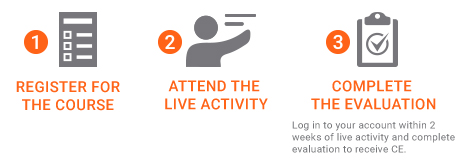Preparing for a State Board of Pharmacy Compounding Practice Inspection
This activity will provide compounding pharmacists and technicians with the tools to develop the necessary competence to prepare for, maintain, or acquire licensure for a compounding practice with respect to a State Board of Pharmacy inspection. Unique concepts will be taught, and practice tools provided, to facilitate inspection readiness behaviors and skills that pharmacists and technicians can apply in their day-to-day practice. There will be in-depth assessment and evaluation of relevant legal documents, regulations, and standards of practice currently guiding the compounding industry.
Participants of the activity will learn how to evaluate standard operating procedures and their readiness for an inspection; their completeness, compliance with standards, and data recording requirements. Self-directed inspection techniques will be developed through the use of realistic data recordings during data reviewing activities. Once data recordings are assessed for discrepancies and trends, if required, there will be an appropriate determination of Corrective Action and Preventive Action (CAPA).
Quality, risk, and verification management are fundamental cornerstones of a successful compounding practice and readiness for inspection. Participants will be afforded the opportunity to assess compounding practice behaviors through these three perspective views. Moreover, quality, risk, and verification requirements will be applied to personnel management, property management, general procedures, finished preparations, and patient monitoring and outcome measures. During the live activity, pharmacists and technicians will be given the opportunity to complete an inspection readiness profile as they establish self-directed action plans to improve their inspection readiness in their own compounding pharmacy practice.
Intended audience
Learning Objectives
FOR PHARMACISTS:
- Identify compounding practice parameters under current regulatory jurisdiction.
- Identify relevant regulations and standards of practice in the compounding industry.
- Identify licensing and licensure requirements within one’s own state and for interstate commerce.
- Review standard operating procedures for their compliance with current standards of practice.
- Apply quality, risk, and verification management systems to assist in preparation for an inspection.
- Review realistic recorded data sets for compliance with their corresponding standard operating procedures.
- Analyze data patterns and trends within and between records in the manner of logs and forms.
- Analyze and demonstrate traceability between various compounding practice parameters during times of recall.
- Learn to initiate corrective and preventive measures where appropriate in a compounding practice.
- Relate inspection preparation tools to current good compounding practice parameters.
- Analyze the strengths and weaknesses, and overall inspection readiness, of a compounding practice.
FOR TECHNICIANS:
- Identify compounding practice parameters under current regulatory jurisdiction.
- Identify relevant regulations and standards of practice in the compounding industry.
- Identify licensing and licensure requirements within one’s own state and for interstate commerce.
- Review standard operating procedures for their compliance with current standards of practice.
- Apply quality, risk, and verification management systems to assist in preparation for an inspection.
- Review realistic recorded data sets for compliance with their corresponding standard operating procedures.
- Analyze data patterns and trends within and between records in the manner of logs and forms.
- Analyze and demonstrate traceability between various compounding practice parameters during times of recall.
- Learn to initiate corrective and preventive measures where appropriate in a compounding practice.
- Relate inspection preparation tools to current good compounding practice parameters.
- Analyze the strengths and weaknesses, and overall inspection readiness, for a compounding practice.

JOE CABALEIRO, BS Pharm, RPh
Senior Associate, Gates Healthcare Associates
Disclosure: Accreditation Commission for Health Care Consultant; Gates Healthcare Associates Consultant; Healthrx Group Consultant; MEDISCA Consultant
Mr. Cabaleiro is the former Associate Director of Pharmacy for the Accreditation Commission for Health Care (ACHC); responsible for the development of compounding quality standards. He is also the former Executive Director for the Pharmacy Compounding Accreditation Board (PCAB), and a former surveyor for the Joint Commission on Accreditation of Healthcare Organizations (JCAHO). In addition, Mr. Cabaleiro has served on the United States Pharmacopeia’s Council of the Convention.
A pharmacist for more than 30 years, Mr. Cabaleiro is a nationally recognized expert in non-sterile and sterile compounding, pharmacy quality, accreditation standards, and compounding pharmacy management and operations. Mr. Cabaleiro began his career in home-infusion therapy as pharmacy manager. In 1982, he developed an innovative compounding computer system used nationwide that combined a notebook computer, barcode reader, and electronic balance to permit the safe preparation of complex total parenteral nutrition solutions. He served multiple facilities in the roles of operations and general management during this period of his professional career.
In 1989, Mr. Cabaleiro founded and led a compounding pharmacy, catering to both human and veterinary patients in Cary, North Carolina. During his ownership of the pharmacy, he helped establish the Pharmacy Compounding Accreditation Board (PCAB) and served on various committees that developed industry standards. His pharmacy was among the first to receive PCAB accreditation. After selling the pharmacy, Mr. Cabaleiro joined PCAB during the organization’s most dynamic period of growth.
Mr. Cabaleiro received his Bachelor of Science in Pharmacy from the University of Florida. He has served as an adjunct professor at the University of North Carolina, and has written numerous articles in professional journals, as well as policy and procedure manuals for home-infusion and compounding pharmacies.
CPE Credits: 8 CPE Hours = 0.8 CEUs
Joint Accreditation Status (University of Florida College of Pharmacy / LP3 Network)
Activity type: Application-based
UAN: 0012-0000-15-016-L03-P/T for pharmacists and technicians
To receive CPE credits for the live component, participants must demonstrate full and satisfactory participation, and submit a completed evaluation to the University of Florida College of Pharmacy.
Participants registered in the United States can obtain a statement of credit from their NABP e-profile. The University of Florida College of Pharmacy will report CPE credits to the CPE Monitor. Participants registered other than in the United States will receive a statement of credit by mail.

International participants should verify with their respective governing board for accreditation equivalency.

 Facebook
Facebook X
X LinkedIn
LinkedIn Forward
Forward

